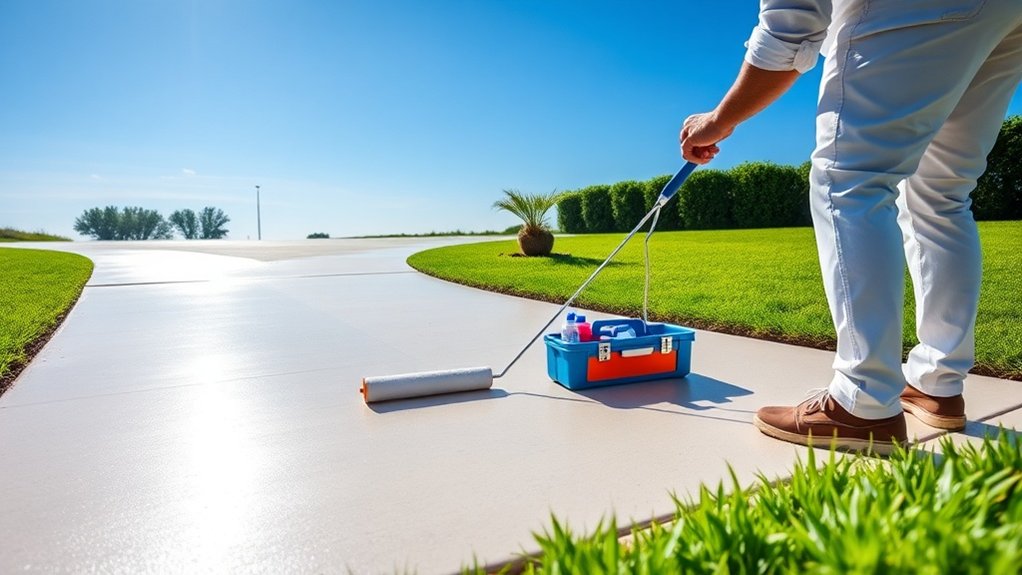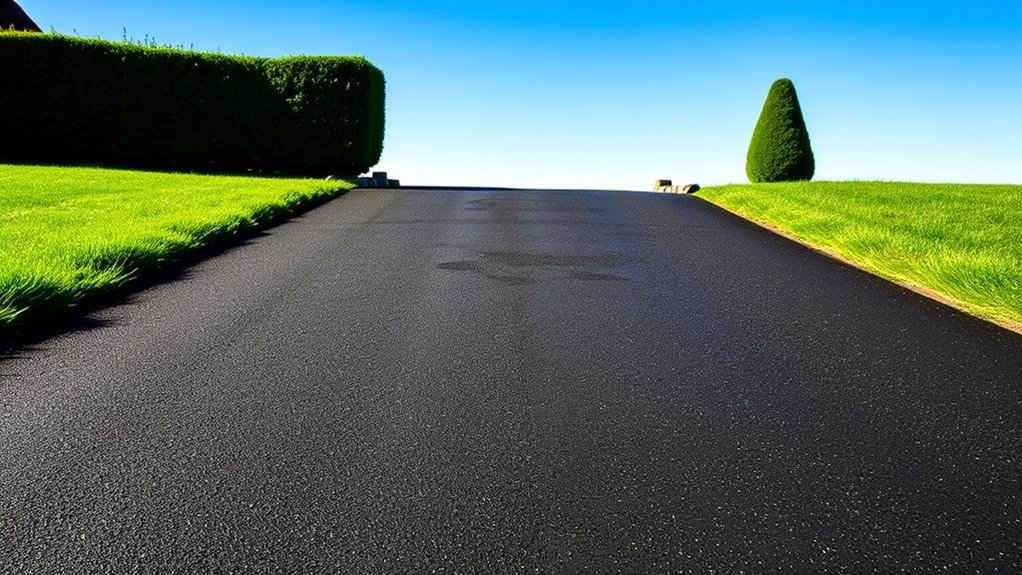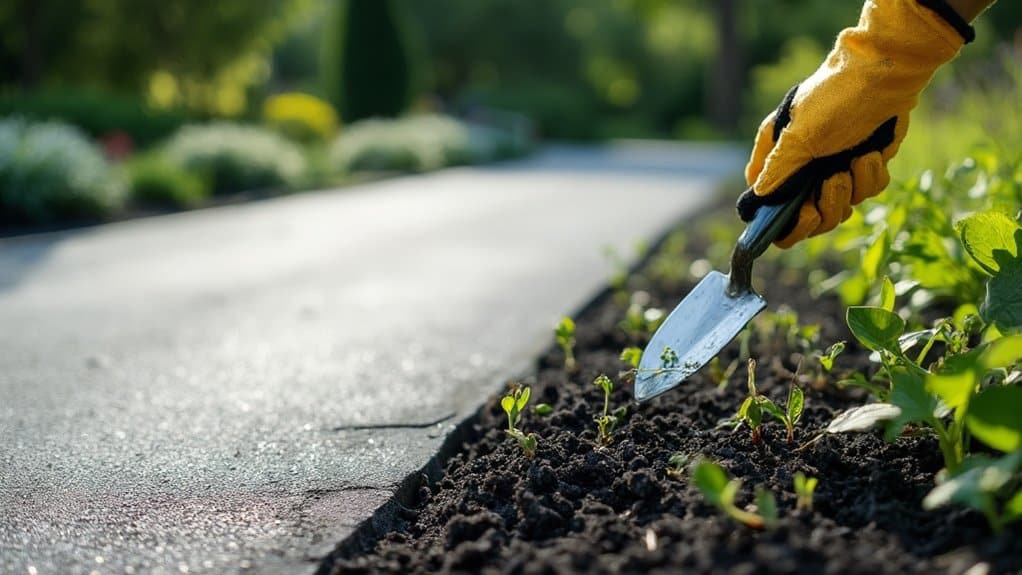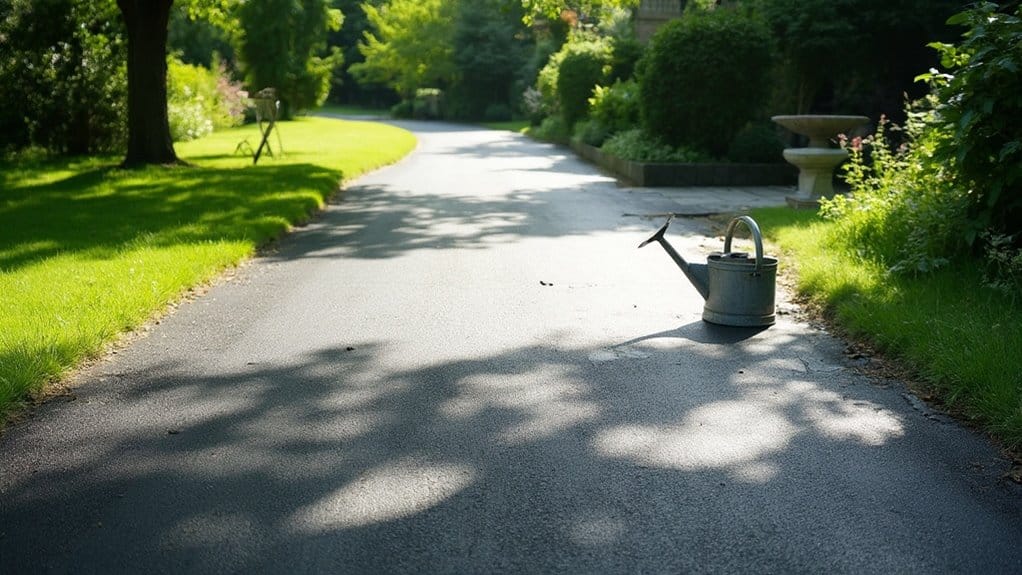To prevent stains on your concrete driveway, maintain a regular cleaning routine. Pressure wash the surface once a year and seal it every 1-2 years to protect against spills and wear. Clean up oil or chemical spills quickly using absorbent materials to minimise damage. Avoid using de-icing chemicals in winter months to safeguard the surface. Following these steps can significantly improve the durability and appearance of your driveway. Next, explore techniques for tackling tough stains.
Table of Contents
ToggleKey Takeaways
- Regularly clean the driveway to remove dirt, leaves, and other debris that can cause stains.
- Apply a high-quality concrete sealer every 1-3 years to guard against oil, chemical spills, and moisture.
- Clean up spills from fertilisers or metal objects quickly to reduce the risk of rust stains.
- Use rust-resistant coatings on outdoor furniture to prevent corrosion from transferring onto the driveway.
- Ensure proper drainage and limit the use of road salt to minimise potential staining effects.
Importance of Regular Cleaning and Maintenance
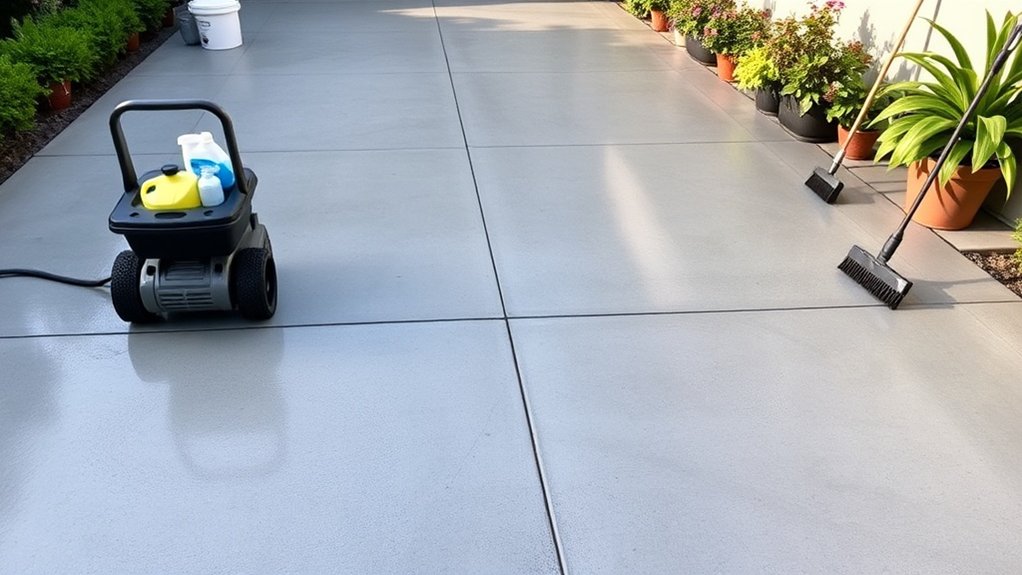
Regular cleaning and maintenance are essential for maintaining the integrity and appearance of your concrete driveway. Setting a regular cleaning schedule helps remove harmful substances like algae, mould, and oil stains that can damage your driveway over time. By sticking to a consistent maintenance routine, you can stop dirt and grime from acting as abrasive agents, which can lead to quicker wear and tear. Regularly clearing away these contaminants also helps prevent cracks and spalling, which can extend the lifespan of your driveway. Furthermore, a clean surface ensures safe traction, reducing slip hazards. In short, prioritising cleaning and maintenance not only boosts the visual appeal of your driveway but also protects your investment, saving you from costly repairs or replacements in the future. Additionally, professional driveway cleaning can effectively restore the appearance of your driveway, making it look new again. Using effective cleaners can enhance the overall maintenance process, ensuring a cleaner and more durable surface.
Effective Use of Concrete Sealers
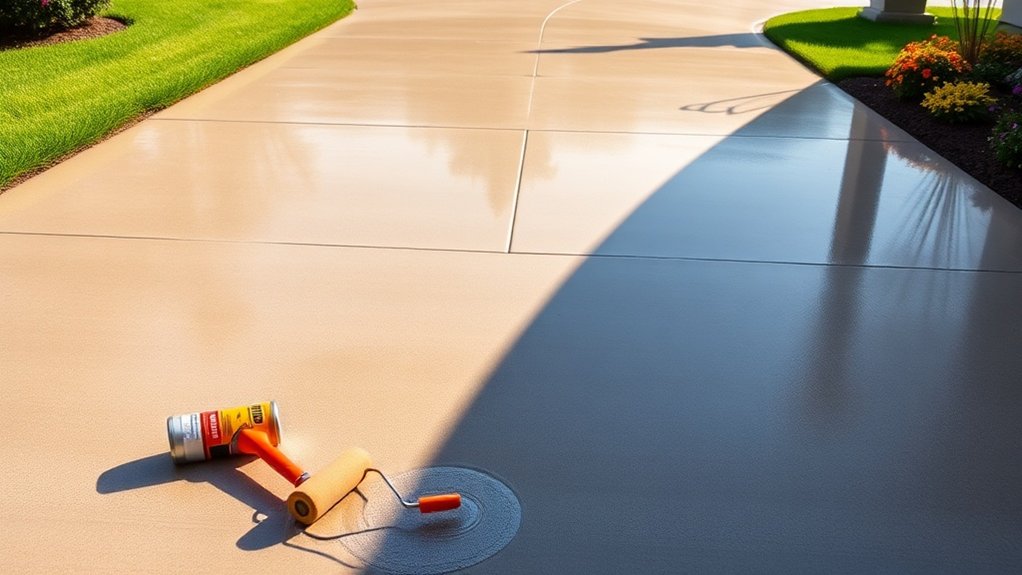
To protect your concrete driveway, it’s vital to understand the various types of sealers available. Consider how often you’ll need to apply them and the specific benefits they provide, such as resistance to stains and improved durability. Selecting the right sealer can significantly enhance both the lifespan and appearance of your driveway. For instance, a penetrating sealer might be ideal for outdoor surfaces exposed to the elements, while an acrylic sealer can offer a glossy finish for added aesthetic appeal. Additionally, using a sealer can increase the longevity of concrete surfaces by providing essential protection against wear and tear. The choice of sealer can also affect how well it withstands temperature fluctuations, ensuring your driveway remains in excellent condition throughout the seasons.
Types of Concrete Sealers
Choosing the right concrete sealer can significantly improve the durability and appearance of your driveway. Here’s a quick comparison to help you make an informed choice:
- Acrylic Sealers: Easy to apply, these create a thin protective layer and are great for enhancing appearance, available in various sheen levels.
- Penetrating Sealers: These form an invisible barrier, making them ideal for outdoor use. They allow moisture to escape while protecting against damage from salts and mould, making them a great option for specific properties of penetrating sealers.
- Polyurethane Sealers: Known for their excellent abrasion resistance and UV stability, these are ideal for high-traffic areas, though they may release higher levels of VOCs.
Familiarise yourself with the application methods for each type to achieve the best results.
Each sealer meets specific needs, so choose one that suits your driveway’s use and environment.
Application Frequency Guidelines
To keep your concrete driveway in good condition, it’s essential to follow the recommended application frequency for sealers.
Acrylic sealers should be reapplied every 1 to 3 years for optimal protection. In contrast, epoxy or polyurethane sealers can last between 5 to 10 years. Penetrating sealers may also last up to 10 years but need regular checks to ensure they’re still effective.
For outdoor surfaces, aim to seal every 2 to 3 years, particularly in high-traffic areas where wear is more pronounced.
Several factors can affect how often you need to reapply sealers, such as exposure to harsh weather, UV damage, and chemical spills.
Look out for signs that indicate a need for reapplication, like water pooling on the surface, discolouration, or visible cracks. Adjusting your sealing schedule based on these indicators will help keep your driveway protected and looking good.
Benefits of Sealing
Here is the revised content:
Sealing your concrete driveway provides several benefits that improve its durability and appearance. By choosing the right type of sealer, you can protect your investment and enhance your home’s kerb appeal.
Here are three key advantages of sealing:
- Enhanced Protection: Sealed surfaces are more resistant to oil, chemical spills, and moisture, which helps prevent deep stains and damage from freezing and thawing.
- Extended Lifespan: A sealed concrete driveway can last for decades with minimal upkeep, whereas unsealed driveways may start to deteriorate within just a few years.
- Aesthetic Benefits: Sealers can enhance colour and shine, helping your driveway maintain a fresh, polished look that can attract potential buyers and increase property value.
Additionally, sealing a driveway not only helps preserve your driveway’s integrity but also boosts its visual appeal, making it a vital part of driveway maintenance.
Strategies to Prevent Rust Stains
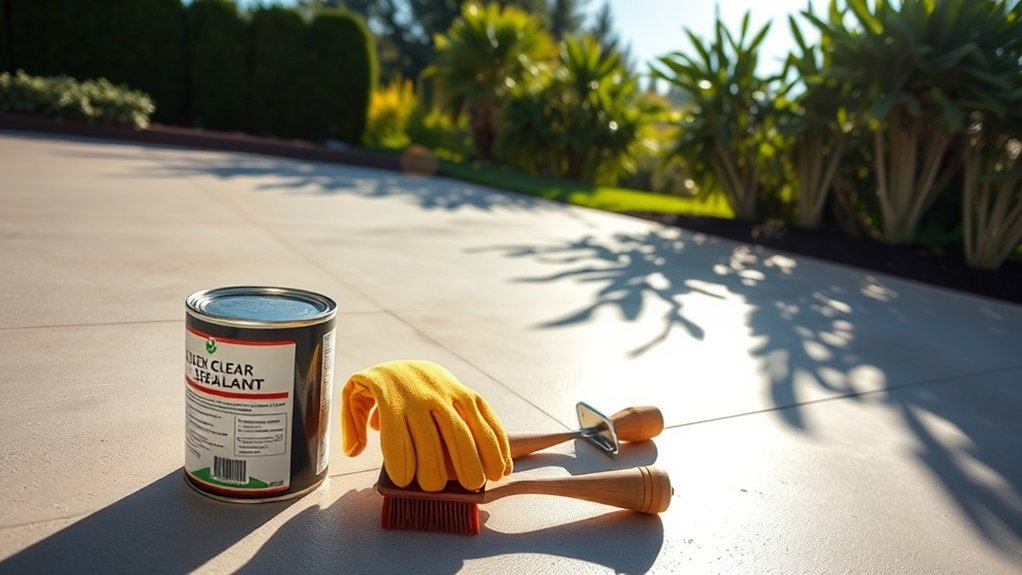
To effectively prevent rust stains on your concrete driveway, it’s important to use a few straightforward strategies.
Start by applying concrete sealers each year to create a protective barrier against moisture and contaminants. Regularly pressure wash the surface to remove dirt and any iron-containing residues that might lead to stains.
Clean up spills from fertilizers or metal objects promptly to minimise rust sources. Use rust-resistant coatings on outdoor furniture to prevent corrosion from transferring to your driveway.
For maintenance, natural acidic cleaners like vinegar can help dissolve early rust deposits.
Lastly, manage your environment by limiting the use of road salt, ensuring proper drainage, and addressing any cracks quickly.
Following these steps will help keep your driveway looking its best.
Managing Oil Stains From Vehicles
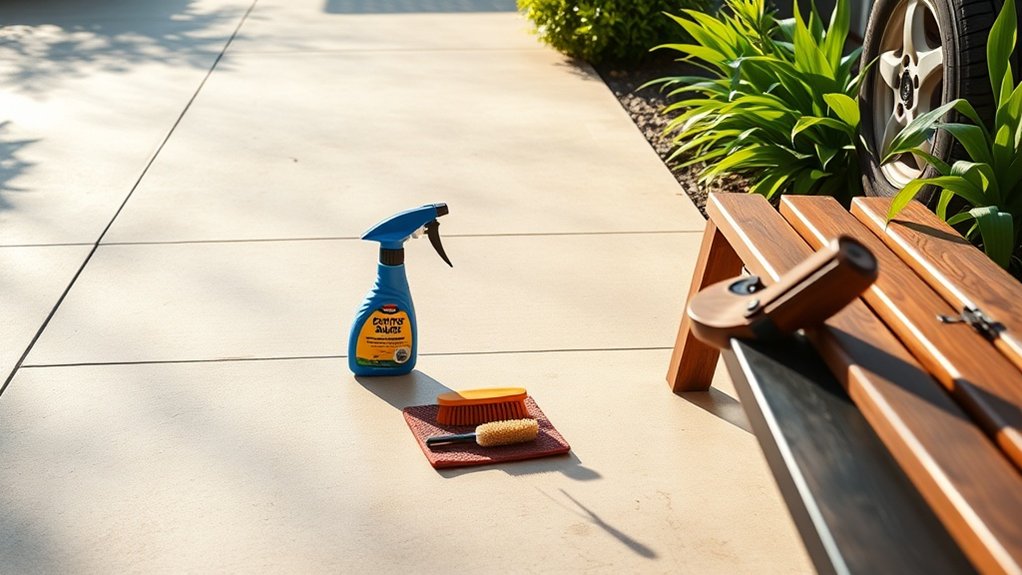
To effectively manage oil stains from vehicles, using drip trays can significantly reduce the chances of spills reaching your driveway.
It’s also crucial to clean up any oil spills promptly; the sooner you act, the easier it’s to prevent the oil from seeping into the concrete.
These simple strategies will help keep your driveway looking good and in good condition.
Use Drip Pans
Managing oil stains from vehicles can be tricky, but using drip pans can effectively catch leaks before they stain your driveway. Here are three common types to consider:
- Galvanised Steel Pans: Tough and weather-resistant, ideal for outdoor use.
- Plastic Drip Pans: Lightweight and resistant to chemicals, making them easy to move around.
- Disposable Absorbent Mats: Handy and simple to replace when they become saturated.
For proper maintenance, regularly empty and clean reusable pans to avoid overflow.
Always check their placement to ensure stability and adequate coverage.
Immediate Spill Cleanup
Spills can still occur even with drip pans in place, so it’s essential to address them quickly to keep your concrete driveway looking its best.
For fresh oil stains, act fast. First, soak up the oil with non-clumping cat litter or baking soda, covering the spill generously for around 10 minutes. If needed, spray brake cleaner or carburettor cleaner before adding the absorbent material.
Use cloths or paper towels to mop up any excess oil. Then, apply a degreaser directly to the stain and scrub with a stiff brush to lift the oil.
Finally, rinse thoroughly with a pressure washer to ensure complete removal and prevent any lasting damage to your driveway.
Reducing Tire Marks on Driveways
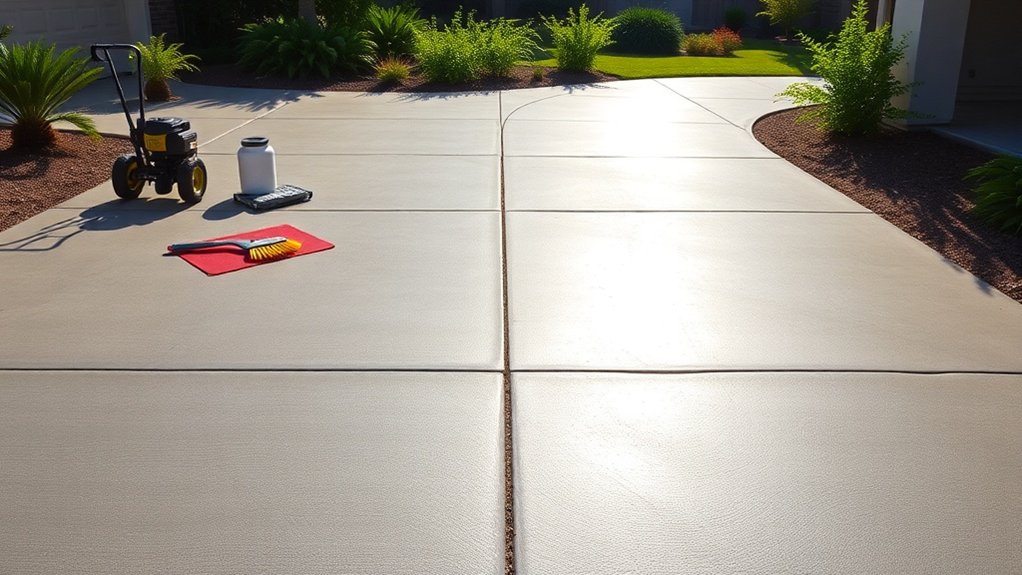
Reducing tyre marks on your driveway involves using quality sealers, maintaining regular cleaning, and ensuring proper surface preparation.
Here are three effective tips:
- Use a high-quality, film-forming sealer that cures properly, creating a protective layer against tyre residues.
- Clean your driveway regularly with strong degreasers and a pressure washer to eliminate tyre rubber and prevent accumulation.
- Prepare the surface correctly by sealing freshly laid concrete to reduce tyre rubber sticking.
These steps can help keep your driveway looking its best.
Immediate Response to Chemical Spills
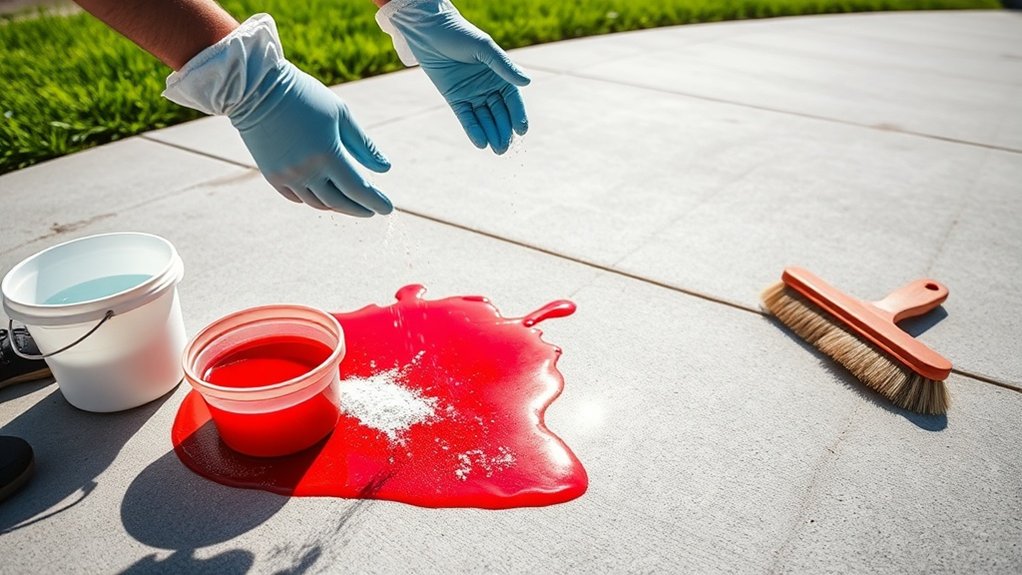
When a chemical spill happens on your concrete driveway, it’s crucial to act quickly to prevent staining.
Begin by using absorbent materials like cat litter or baking soda to soak up the excess liquid without spreading it.
Avoid rinsing the area at first; instead, blot the spill to keep it contained and manageable.
Prompt Cleanup Techniques
Act promptly to manage chemical spills on your concrete driveway, as swift action is crucial for effective cleanup.
Begin by identifying the type of spill to determine the appropriate cleanup method.
Follow these straightforward cleanup steps:
- Contain the spill using absorbent materials, like spill socks, to prevent it from spreading.
- Assess the spill within the first few hours; fresh spills typically respond better to common household cleaners.
- Wear protective gear such as gloves and safety goggles to ensure your safety during the cleaning process.
Absorbent Material Usage
Using the right absorbent materials is crucial for managing chemical spills on your concrete driveway. Different types of absorbents serve specific purposes.
For oil and hydrocarbon spills, polypropylene absorbents are lightweight and can absorb up to 20 times their weight. Clay-based options are cost-effective and commonly used.
When dealing with hazardous chemicals, synthetic polymer absorbents are effective for absorbing acids and solvents. Specialty absorbents can neutralise and encapsulate dangerous liquids, safeguarding your driveway.
Consider eco-friendly options like bio-remediation absorbents, which are safe for the environment. Quick application methods, such as absorbent pads or granules, can improve spill management efficiency.
Always act promptly to avoid damage and maintain the integrity of your driveway.
Seasonal Care for New Concrete
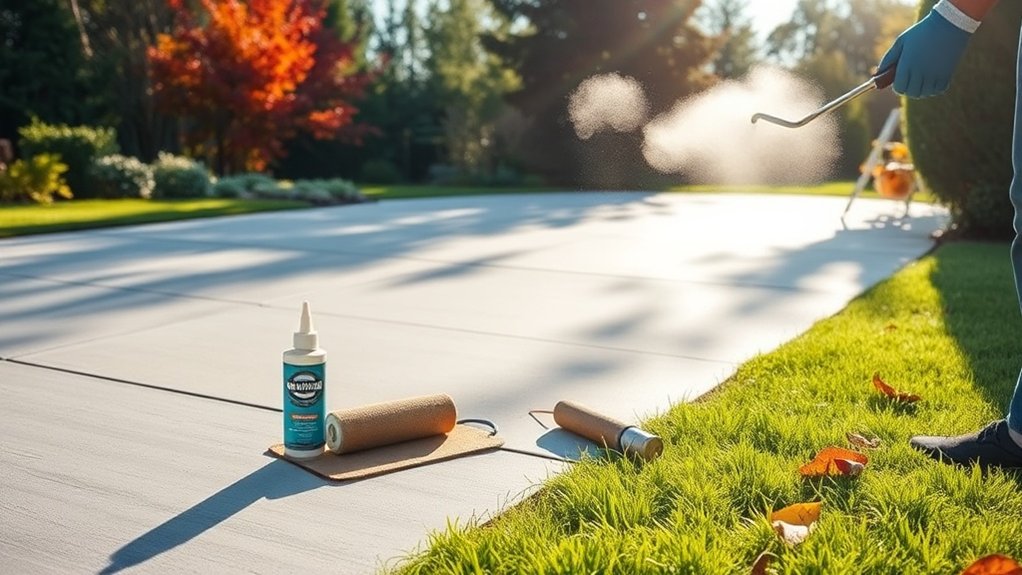
To ensure the longevity and durability of your new concrete driveway, it’s crucial to implement seasonal care, particularly during its first winter.
Taking steps to protect it from the cold can significantly reduce the risk of damage. Here are three essential actions to consider:
- Cover the new concrete with insulating blankets or straw to retain warmth and prevent freezing.
- Steer clear of de-icing chemicals; opt for sand or kitty litter instead to provide traction on icy surfaces.
- Keep an eye on weather forecasts and consider postponing pouring or curing during particularly severe cold spells.
Recommended Routine Maintenance Techniques
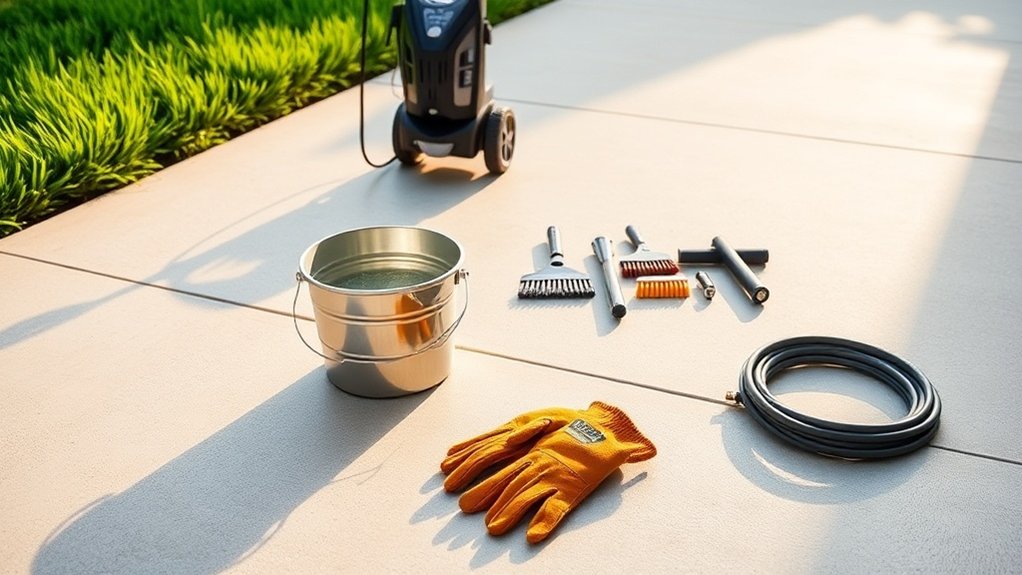
Maintaining your concrete driveway is key to ensuring it looks good and lasts a long time. Following a regular maintenance routine can significantly improve both its appearance and durability.
| Maintenance Technique | Frequency | Purpose |
|---|---|---|
| Regular Cleaning | Weekly | Prevents surface stains and debris |
| Power Washing | Annually | Removes stubborn stains |
| Sealing | Every 1-2 years | Guards against water and oil stains |
Additionally, use biodegradable detergents for spot treatments on oil and grease stains. Ensure proper drainage to avoid water pooling, and keep your gutters clear. By sticking to these techniques, you’ll protect the beauty and strength of your concrete driveway.
Stain Removal Techniques for Tough Stains
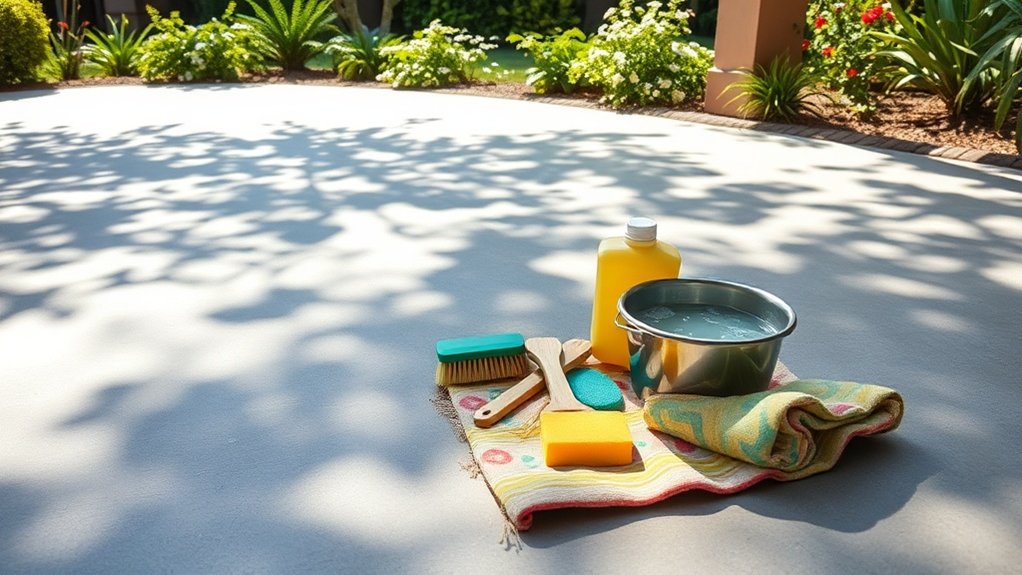
When tough stains spoil your concrete driveway, you’ll need effective removal methods to restore it. Here are three straightforward techniques:
- Oil Stains: Use a commercial degreaser or mix baking soda with vinegar. This combination fizzes, making it easier to lift the stain as you scrub.
- Rust Stains: Combine vinegar and baking soda, apply it to the stain, let it sit, then scrub and rinse thoroughly for a deep clean.
- Paint Stains: Dissolve trisodium phosphate in hot water, soak the stained area, and scrub. For stubborn spots, apply a suitable solvent following the manufacturer’s guidelines.
These methods not only remove stains but also help keep your driveway looking great and prolong its life.
Environmental Considerations for Driveway Care
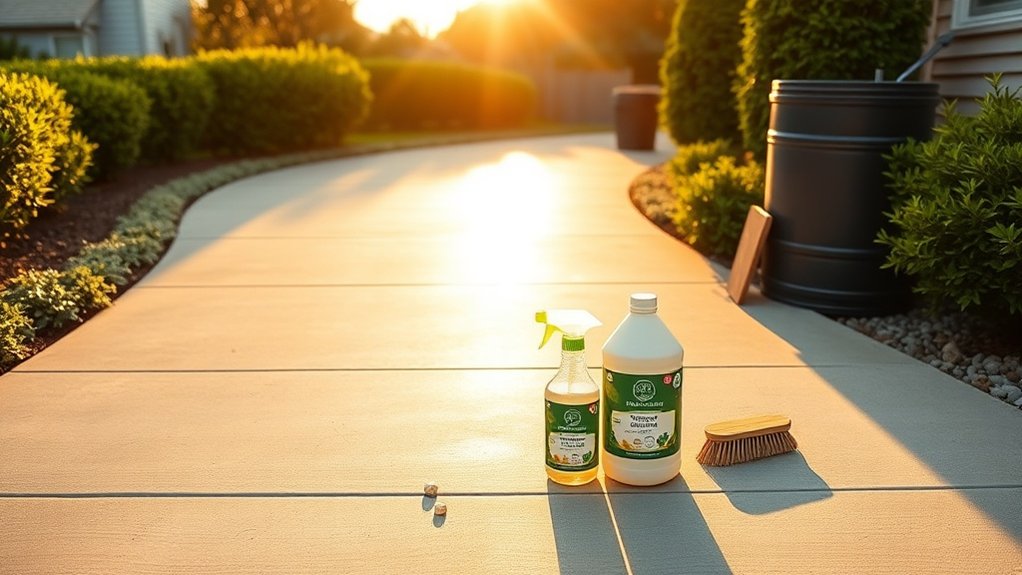
Caring for your concrete driveway with environmental considerations can significantly improve its lifespan and sustainability.
Choose eco-friendly materials, such as recycled aggregates and locally sourced components, to reduce resource use and transport emissions. Consider using permeable concrete to aid groundwater replenishment and lessen stormwater runoff.
Regularly sweeping your driveway and using environmentally friendly cleaning products can help prevent harmful runoff.
Seal your concrete every 2 to 3 years with eco-conscious sealants to keep moisture out. Address any cracks promptly to maintain structural integrity and prevent water damage.
Lastly, steer clear of harsh chemicals and opt for non-corrosive de-icing agents to protect your driveway and the surrounding environment.
Frequently Asked Questions
How Often Should I Reseal My Concrete Driveway?
You should reseal your concrete driveway every 2 to 3 years for proper maintenance. If your driveway sees a lot of use, such as from multiple vehicles or heavy foot traffic, consider resealing it every 1 to 2 years to ensure it stays protected.
Can I Use Bleach to Clean My Concrete Driveway?
Using bleach to clean your concrete driveway can make it look brighter, but it also poses risks of discolouration and long-term damage. While the immediate results might be tempting, regular use can wear away the concrete’s surface, leading to expensive repairs later on. It’s best to consider alternative cleaning methods.
What Are the Best Types of Concrete Sealers?
The best types of concrete sealers are acrylic sealers for decorative finishes and epoxy sealers for robust protection. Choose based on your requirements: if you prioritise aesthetics, go for acrylic; if you need durability and resistance to chemicals and stains, opt for epoxy.
Is It Safe to Use Pressure Washers on All Concrete?
Using pressure washers on all types of concrete isn’t advisable. It’s important to consider the condition of the concrete surface. For instance, older or crumbling concrete can be damaged by high-pressure water. Always test a small, inconspicuous area first to assess safety.
How Long Does It Take for Concrete to Cure?
Concrete usually takes around 28 days to fully cure and achieve its optimal strength. It’s crucial to keep the concrete moist during this period to ensure durability and prevent issues like surface damage and staining. For example, if you’re pouring a patio, regular watering or covering it with wet burlap can help maintain the necessary moisture levels.
Conclusion
To keep your concrete driveway in top condition and prolong its lifespan, it’s essential to take a few preventive steps. Regular cleaning, effective sealing, and quick action against stains are crucial to avoid expensive repairs later on. It’s much simpler to prevent stains than to deal with them afterwards. With routine maintenance, your driveway will not only enhance your property’s appearance but also reflect your commitment to its upkeep. Take action now for lasting results.
Optimize your tarmac driveway's appearance with simple maintenance tips, but discover the crucial secrets that can extend its lifespan even Read more
Find out effective methods to keep weeds at bay on your tarmac driveway and discover the crucial steps you need Read more
How to extend the life of your tarmac driveway starts with simple maintenance techniques that can lead to surprising results Read more

